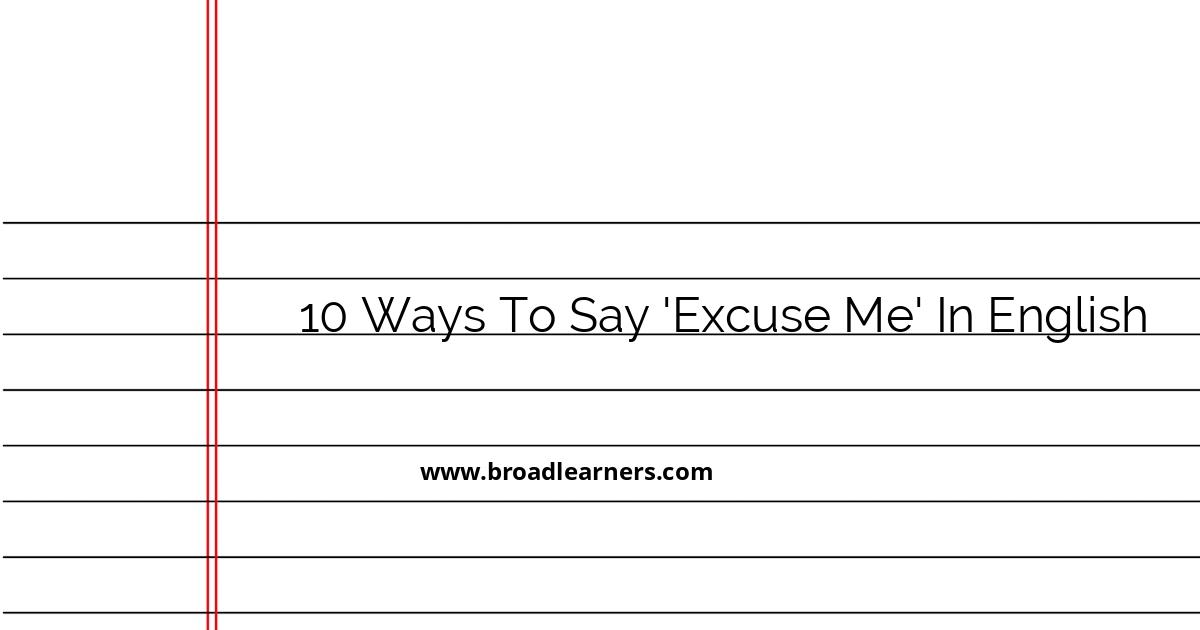The phrase 'Excuse Me' is a common courtesy used in English when one needs to politely interrupt, seek attention, or apologize in various situations. However, there are numerous ways to convey this sentiment while maintaining politeness and appropriateness for different contexts. In this article, we discuss 10 polite alternatives to say 'Excuse Me' in English:
- Pardon Me
- I'm Sorry
- May I Interrupt?
- Apologies
- Could I Get Your Attention?
- Forgive Me
- Allow Me
- Do You Mind?
- Sorry to Disturb
- Beg Your Pardon
Let's delve deeper into each of these alternatives to understand their usage effectively:
1. Pardon Me
'Pardon Me' is a polite way to ask someone to repeat what they said or to nudge gently for permission to pass by. It is often used when you need to clarify or hear something again due to noise or misunderstanding.
Example:
"Pardon me, could you repeat the last part of your presentation?"
2. I'm Sorry
This phrase can be used when you slightly bump into someone or when you realize you may have intruded. It's a gentle apology that signals respect for the other person's space or time.
Example:
"I'm sorry, I didn't mean to interrupt your conversation."
3. May I Interrupt?
This preemptive phrase is used before breaking into a conversation. It shows respect for the ongoing dialogue and ensures that your input is perceived as necessary rather than unwelcome.
Example:
"May I interrupt for a moment to add something to this discussion?"
4. Apologies
Offering 'Apologies' is a straightforward acknowledgment that you might be inconveniencing someone. It's a formal expression suited for academic or professional settings.
Example:
"Apologies for cutting in, but I have an update on the project."
5. Could I Get Your Attention?
Use this polite question when you need to address a group or individual directly but don't want to seem overly assertive. It is often used in presentations or meetings.
Example:
"Could I get your attention for a brief announcement?"
6. Forgive Me
This phrase conveys a level of sincerity and politeness when interrupting. It implies humility and regard for the person being addressed.
Example:
"Forgive me, but I believe there's a mistake in the report."
7. Allow Me
'Allow Me' is paired with a gesture or action, like assisting someone or offering to speak. It reflects a polite willingness to participate or help.
Example:
"Allow me to assist you with finding that document."
8. Do You Mind?
This phrase is useful when you need to request something, like space or time, indicating that you are considering the other person's stance before proceeding.
Example:
"Do you mind if I join this meeting for additional insights?"
9. Sorry to Disturb
This apologetic phrase is handy when entering a space or conversation uninvited, signaling a wish to intrude as minimally as possible.
Example:
"Sorry to disturb, I just wanted to hand over these documents."
10. Beg Your Pardon
The formal and traditionally respectful 'Beg Your Pardon' can replace 'Excuse Me' to subtly question, clarify, or apologize for an intrusion.
Example:
"I beg your pardon, but could you direct me to the nearest exit?"
Each of these alternatives can be utilized in different scenarios to maintain politeness and consideration for others. Understanding the context in which each phrase fits ensures effective communication and positive interpersonal interactions.

Did I miss anything? Respond below